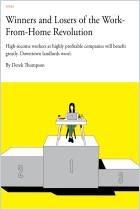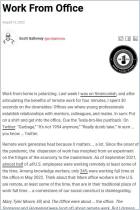
Remote Workers Are Losing Out on Promotions, New Data Shows
New data shows that people who log on from home five days a week get fewer promotions and less mentoring than people in the office
Read or listen offline
Amazon KindleRecommendation
Journalist Te-Ping Chen of The Wall Street Journal reports on studies showing that remote workers are promoted less often than those who work on-site. In some cases, leaders’ preference for in-office workers affects remote employees’ raises and promotions. Even though in-person collaboration, networking, and mentorship help foster career growth, companies still need to ensure growth opportunities for their remote workers. While hybrid workers are promoted much like in-office employees, fully remote workers – despite being more productive – are rewarded and promoted less often. However, Chen reports, many remote workers are willing to sacrifice career advancement to gain a better work-life balance.
Summary
About the Author
Te-Ping Chen writes for The Wall Street Journal and has worked for the International Consortium of Investigative Journalists. He is also the author of a book of short stories, Land of Big Numbers.




















Comment on this summary